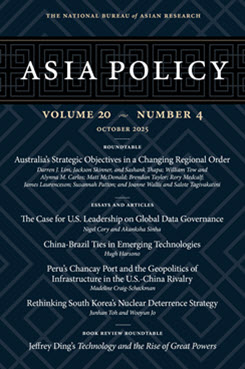Roundtable in Asia Policy 20.4
Jeffrey Ding’s Technology and the Rise of Great Powers: How Diffusion Shapes Economic Competition
How do technological revolutions shape great powers and great-power competition? In this book review roundtable on Technology and the Rise of Great Powers: How Diffusion Shapes Economic Competition, Daniel W. Drezner, Xinyue Wei, Etel Solingen, David C. Kang, Victor Seow, and Jeffrey Ding discuss the role technology diffusion plays in determining which states become great powers and implications for the current Fourth Industrial Revolution.
An Apolitical Theory of Great-Power Transitions
Daniel W. Drezner
Why Diffusion Wins (Sometimes)
Xinyue Wei and Etel Solingen
Why Japan Was Never Likely to Catch Up to the United States but China Is
David C. Kang
The Steel Flea and the Diffusive State
Victor Seow
Author’s Response: Extensions To General-Purpose Technology Diffusion Theory
Jeffrey Ding
Daniel W. Drezner is Academic Dean and Distinguished Professor of International Politics at the Fletcher School at Tufts University, a Nonresident Senior Fellow at the Chicago Council on Global Affairs, and the Co-director of Fletcher’s Russia and Eurasia Program (United States).
Xinyue Wei is a PhD student in the Department of Political Science at the University of California, Irvine (United States).
Etel Solingen is Distinguished Professor and Thomas T. and Elizabeth C. Tierney Chair in Peace and Conflict Studies at the University of California, Irvine (United States).
David C. Kang is the Maria Crutcher Professor of International Relations at the University of Southern California and a Nonresident Fellow at the Quincy Institute (United States). His latest book is Beyond Power Transitions: The Lessons of East Asian History and the Future of U.S.-China Relations (coauthored with Xinru Ma, 2024).
Victor Seow is the John L. Loeb Associate Professor of the Social Sciences in the Department of the History of Science at Harvard University (United States), where he focuses on the history of science and technology in East Asia. He is the author of Carbon Technocracy: Energy Regimes in Modern East Asia (2022), which received several awards, including the Association for Asian Studies’ John Whitney Hall Book Prize and the Society for Historians of American Foreign Relations’ Michael H. Hunt Prize for International History.
Jeffrey Ding is an Assistant Professor of Political Science at George Washington University (United States). His book Technology and the Rise of Great Powers received the 2025 Lepgold Book Prize, awarded to each year’s best book in international relations.
About Asia Policy
Asia Policy is a peer-reviewed scholarly journal presenting policy-relevant academic research on the Asia-Pacific that draws clear and concise conclusions useful to today’s policymakers. Asia Policy is published quarterly in January, April, July, and October and accepts submissions on a rolling basis. Learn more


